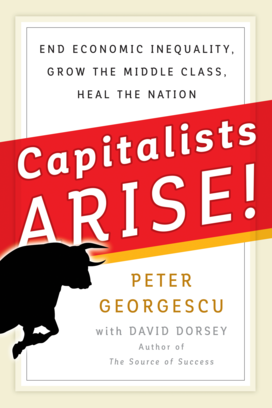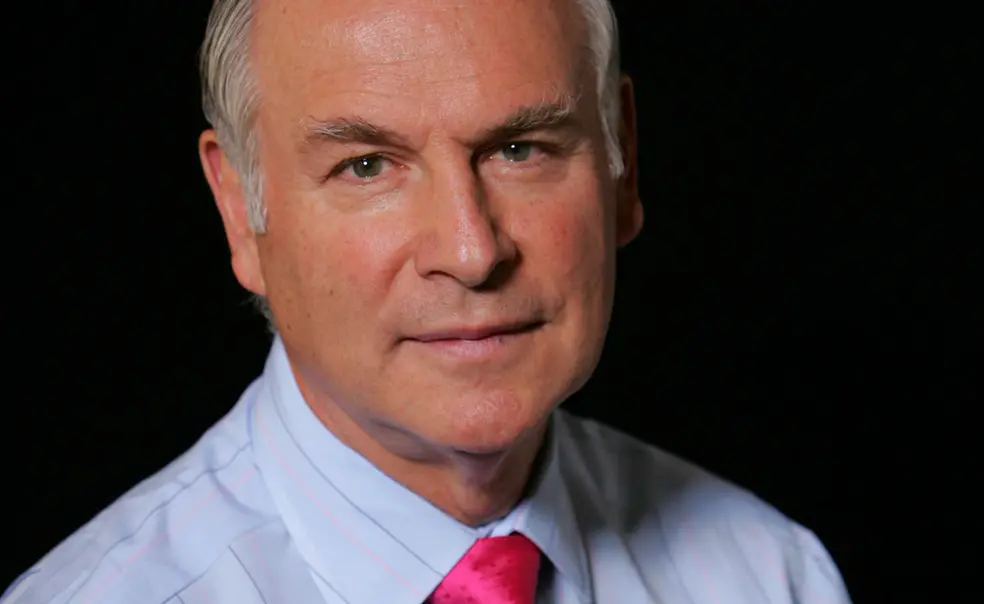Capitalist Arise! Issues a Call to Action

The author: Georgescu is chairman emeritus of Young & Rubicam, which has more than 300 offices around the globe; vice chairman of New York Presbyterian Hospital; and a member of the Council on Foreign Relations. He is the author of two previous books: The Source of Success: Five Enduring Principles at the Heart of Real Leadership (Wiley) and The Constant Choice: An Everyday Journey From Evil Toward Good (Greenleaf Book Group Press).
Opening lines: I’m up early, ready for breakfast with an old friend, Ken Langone, who is planning to pick me up and take me to his favorite Florida haunt for a meal. I’m going to tell him how worried I am about the state of our economy. My hopes for the future depend on being able to find common ground with people like Ken: conservative, smart, and willing to recognize that our system is in trouble.
Reports regularly tell us that our economy is recovering, but I don’t believe it. Certain indicators are up, but people are living in debt, and incomes have been stagnant for decades. Meanwhile, during those same years, roughly since the mid-1970s, profits and productivity have risen, with only occasional slight dips before bouncing back to the same rate of increase from year to year. What’s happened over those years is that most people have been locked into their stations in life, while the corporations that employ them are thriving. Opportunities to improve and get ahead have withered, and though many people are getting by—while getting deeper into debt in the process—they are losing hope. What’s needed is action from people like Ken, who have the power to influence how we do business—because business, the private sector, is what generates opportunity in a free-market capitalist system. Without the creation of new opportunities within the private sector, that profit-making system itself will come apart. If wealth rises to the highest ranks of our society without circulating back into the system in the form of wages and benefits, then spending inevitably declines or collapses.
While some celebrate how stock prices are still booming and productivity is still increasing at modest rates, the majority of Americans feel left out and know they have less and less ability to buy the things they want and need. At some point, the choke point of this economy, the middle-class pocketbook, will quit opening. What follows won’t be pretty. We need a different sense of how to do business as a whole—a way that takes into account all stakeholders, not simply those who own stock in the company.
First of all, and most importantly, employers need to raise wages. Wages would be rising already if our private sector were devoted to long-term profits rather than short-term gains. A focus on steady, long-term growth may be unheard of now in most public companies, but it was standard operating procedure for corporations in the 1950s and ’60s, until we wilted in the face of foreign competition and the global economy and became obsessed with shareholder value.
Given these factors, two key questions are addressed throughout this book:
• Why doesn’t the private sector see how precarious income inequality has made its profitability and seek productive solutions that both close the wealth gap and spur greater profitability?
• Can we admit that our current business model has been responsible in a major way for a crisis of inequality, and can we wake up and take action now, rather than continue doing business the way it’s been done for more than four decades, until the whole system risks falling apart?
Reviews: Darren Walker, president of the Ford Foundation, says, “In Capitalists Arise! Peter Georgescu has issued a challenge to America's captains of business, industry, and finance to step forward and reclaim capitalism as a means of creating wealth and shared prosperity. Georgescu warns that without developing a more inclusive capitalism that generates broader opportunity and social mobility, we risk destroying our economy and even our democracy. Capitalists Arise! is a clarion call by a great American patriot and business leader written out of love for his country and his unwavering belief in our nation's ideals of fairness, opportunity, and justice.”












No responses yet